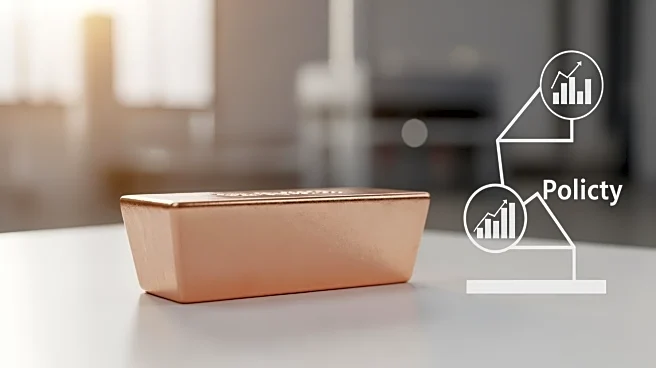What's Happening?
President Donald Trump has reversed a Biden-era regulation that imposed stricter limits on emissions from copper smelters. The original rule, finalized in May 2024, required smelters to reduce pollutants
such as lead, arsenic, mercury, benzene, and dioxins under updated federal air standards. Trump's proclamation grants a two-year exemption from compliance for affected stationary sources, aiming to promote American mineral security by reducing regulatory burdens on domestic copper producers. The decision affects two copper smelters in the United States, operated by Freeport-McMoRan in Arizona and Rio Tinto in Utah. Freeport-McMoRan expressed gratitude for the exemption, highlighting copper's importance for national security. Rio Tinto's Utah smelter was not impacted by the 2024 order due to its investment in emission-capturing equipment.
Why It's Important?
The reversal of the emission rules is significant as it addresses concerns about the operational realities facing domestic copper smelting. By easing regulatory burdens, the Trump administration aims to strengthen the U.S. industrial base and reduce reliance on foreign-controlled processing capacity. This move is part of a broader strategy to identify copper as a critical material for defense, infrastructure, and emerging technologies, including clean energy and electric vehicles. The decision also led to a Section 232 investigation, resulting in a 50% tariff on certain imported copper and a mandate for increased domestic sales of high-quality scrap copper. These measures are intended to bolster national security by ensuring a stable supply of copper from domestic sources.
What's Next?
The two-year exemption provides time for domestic copper producers to assess and plan for appropriate regulatory reconsideration of the Copper Rule and future implementation. Stakeholders in the copper industry may need to prepare for potential changes in regulatory standards once the exemption period ends. Additionally, the imposed tariffs and domestic sales mandates could lead to shifts in the copper market, affecting pricing and supply chains. Industry leaders and policymakers will likely continue to monitor the impact of these changes on the U.S. copper industry and national security.
Beyond the Headlines
The reversal of emission rules raises questions about the balance between environmental protection and industrial growth. While the exemption aims to support domestic copper production, it may also lead to increased environmental concerns if emissions are not adequately controlled. The decision highlights the ongoing debate over regulatory approaches to industrial emissions and their implications for public health and environmental sustainability.










